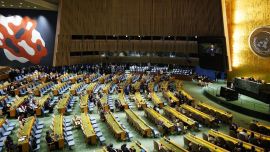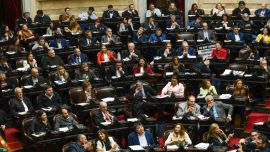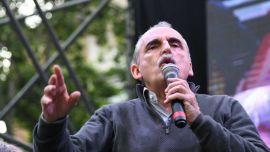Yesterday the two public holidays of Good Friday and Veteran’s Day overlapped for the first time since the latter replaced Malvinas Sovereignty Affirmation Day (June 10) at the start of this century – in my memory at least (always standing to be corrected). This column is thus offered a choice of potential props in a week largely bereft of news, being halved by the Easter festivities and overshadowed by the looming second wave of the coronavirus pandemic – even if Wednesday’s poverty data should give cause for reflection beyond the religious.
Somewhat to my relief, this column’s slug disqualifies me from bearing witness to the South Atlantic war because when up to 10,000 Argentine troops brushed aside the brief resistance of 74 Royal Marines then garrisoning the islands 39 years ago yesterday, I was working in Hamburg recently married to an Argentine and hence the constant butt of some very silly jokes as a couple over the following 11 weeks. Public anger after the defeat was so completely directed against the military dictatorship rather than the wartime foe that I was able to step foot in Argentina only six months later – an extremely rare case of a British immigrant to Argentina in 1982 (I have only come across one other in all the intervening years) – but the fact remains that I was over 13,000 kilometres distant from those islands at the time of the conflict and thus will gratefully sit out that half of yesterday’s public holiday.
That leaves Easter with no such excuses for passing up comment – I must have followed something like 34 Semana Santas from a Buenos Aires Herald newsroom in two different addresses (even if Maundy Thursday was always one of those rare dates in the calendar when everybody was free with no newspaper the following day). Those abbreviated autumn weeks tended to be uneventful even if not always – thus to give one example, the Easter of 1991 marked the birth of Mercosur, the subject of last week’s column with that fractiously futile regional bloc summit only eight days ago (perhaps the first such conclave not to produce a final statement of any kind).
Yet the most memorable Semana Santa of the last generation would undoubtedly be that rocked by the Campo de Mayo carapintada Army uprising of 1987 famously ending with Raúl Alfonsín’s: “Happy Easter, the house is in order” – an iconic defining moment in the consolidation of Argentine democracy perhaps comparable to when King Juan Carlos stood up to the Tejero coup in Spain in 1981 (neither Alfonsín nor the Spanish monarch ended happily as a head of state for all their services to democracy, it might be added). The 30th anniversary of that Easter rising was the subject of a mini-supplement in the Herald then in the last three months of its existence but only four years later that milestone seems lost in time in the past century with military coups so inconceivable today (police mutinies would now seem the bigger danger) – perhaps a tribute to the Alfonsín presidency’s success in bringing to a final end over half a century of alternation between elected governments and military juntas, whatever his ultimate failures.
That April of 1987 was already memorable for the six-day visit less than a fortnight before Aldo Rico’s mutiny of Pope John Paul II (which would have fallen during Easter if the 1987 calendar had coincided with this year’s). Although eclipsed in most memories by the military upheavals shortly afterwards, this visit was a mega-event drawing crowds of up to 300,00 – partly in gratitude to the Polish pontiff for his services in averting war between Argentina and Chile less than a decade previously in the first years of his papacy but also the expression of a mass piety lurking in the national subconscious and needing such triggers to erupt into the open (somewhat akin to the feelings about the “lost sisters” of the Malvinas).
Which brings us back to Easter as the only regular catalyst activating that subconscious in those years. Even then the stereotype of Argentina as a Catholic nation was a tired and superficial cliché for the rest of the year but come Easter and magically all the cinemas and television channels (only three or four back then) would be showing films like The Greatest Story Ever Told and The Ten Commandments while most citizens assumed an expression of solemn piety much as today they would slip on a face-mask when going out in these pandemic times. No genuine godliness but not sheer hypocrisy either, entering a twilight zone of the truth with several layers like an onion. The censuses of 1970 and 1980 registering the percentage of Catholics in Argentina as 94.3 and 94.03 percent respectively (both the products of military governments in cross and sword times) were statistical myths with only a few million people attending Mass every Sunday but on the other hand at least three-quarters of taxis had rosaries dangling from their windscreen mirrors.
Since then there has been a relentless secularisation with the pandemic only widening the distance from those times – not only is The Ten Commandments no longer screened at cinemas long displaced from Corrientes Avenue but for the past year there have been virtually no cinemas (and not even masses in churches last Easter). Only once since 1987 has this columnist seen the explosion of effervescent piety accompanying the visit of John Paul II (when Thomas Aquinas suddenly became a pet conversation topic for many) replicated – when Jorge Bergoglio was elected Pope Francis eight years ago last month.
Perhaps the big change for Easter today is that its themes of Calvary and sacrifice (with vaccination as a resurrection taking a lot longer than three days to transpire) are no longer something to be contemplated once a year on a par with the more festive Christmas turkey and holly but the everyday experience of everybody over the past 13 months – the public health risks of the pandemic for everyone and poverty for all too many.



















Comments